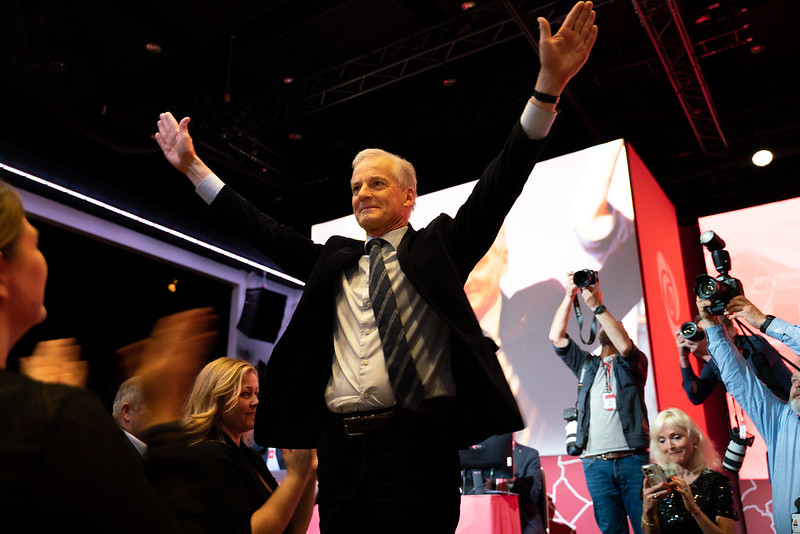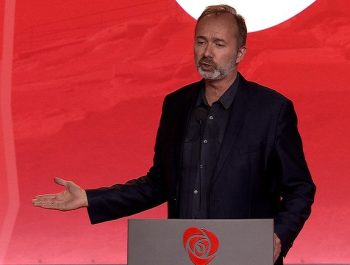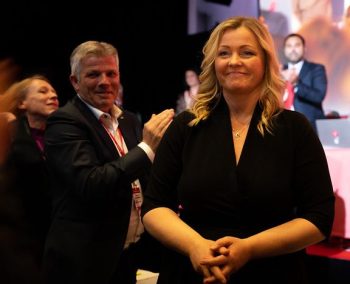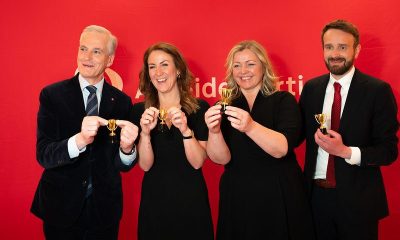Norwegian Prime Minister Jonas Gahr Støre desperately needed to revive enthusiasm and support when his crisis-ridden Labour Party held its annual meeting over the weekend. By most accounts he succeeded, but still faces a big challenge in winning back voters before local elections in September.

Støre could at least enjoy a warm welcome when the meeting began. He clearly relished, even needed, a lengthy standing ovation at the outset, and another one when the meeting wound up on Saturday. In between the two moments of triumph, he also managed to tame some heated personnel conflicts, see a new generation of party leadership elected and ward off an expected uproar over energy.
Norway’s prime minister also literally danced his way down a long table late at night after one of the party’s dinners, but got in trouble with a security guard. “I was a bit eager so I started to go over the tables,” he later told newspaper Adresseavisen. “Then someone from Securitas (the security firm hired in for the evening) came and said it (dancing on tables) wasn’t allowed, so I came down.” He continued dancing, though, this time leading a long line of followers.
It was enough to make many political commentators wonder what happened. The weeks leading up to the annual meeting had otherwise been full of warnings over potential and uncomfortable standoffs:

*** Trond Giske, Støre’s former rival for the party’s top job who now leads what some call a “separatist” party chapter in Trøndelag, had vowed to launch an uproar over energy policy. “We will win!” claimed Giske, who’d lost power himself after a string of sexual harassment complaints but has continued to challenge party leadership in Oslo. He didn’t win, though, ultimately overpowered by the party’s and the government’s own efforts to bring down electricity rates that already are falling from record high levels.

*** Other personnel conflicts were also warded off, even after Støre had been publicly criticized for allegedly intervening in the election of a new party secretary. Støre had supported the incumbent but often-criticized Kjersti Stenseng, who suddenly was challenged by a former government minister for Labour, Helga Pedersen, just weeks before the annual meeting. Støre, though, made a phone call to Pedersen that resulted in Pedersen withdrawing her challenge and going along with the election committee’s choice of candidates. Støre caught a lot of criticism over making the call, the exact contents of which weren’t revealed, but he claimed it was only “natural” for the party leader to question Pedersen’s intentions. He also apparently made it clear that he still supported Stenseng.

*** The committee’s choices to be Støre’s deputy leaders also included two new and relatively young Labour politicians who already are members of Støre’s government: Trade Minister Jan Christian Vestre (age 36) and Education Minister Tonje Brenna (35). Both are survivors of a right-wing extremist’s massacre at Labour’s youth organization’s summer camp on July 11, 2022 and represent what Støre calls “a new generation” of party leaders. They ended up ending former minister Hadia Tajik’s attempt to make a comeback after resigning her post as Labour Minister early last year. Like Støre, she’s also been in conflict with Giske in the past, but now both she and Giske seem to have been sidelined.
Setting aside most of the threats to his authority helped Støre, often accused of being weak and waffling on issues, to also exert some power of his own over the party he leads. Several thorny issues were up before the party including the government’s highly controversial new tax on the salmon farming industry, and whether to raise welfare benefits to Norwegians chronically out of work.
The government already appears likely to ease some portions of the salmon tax, details of which are due in the revised state budget. Then Støre resorted to reminding party members how legendary former Labour leaders like Einar Gerhardsen and Gro Harlem Brundtland argued against raising welfare benefits so high that they could remove incentives to work. He even resorted to some uncharacteristically tough language to grab his audience’s attention. Party members ended up agreeing to only raise the lowest benefits paid to those who already have the least.
Settling the party leadership issue, however, was perhaps the most important for the future of the party itself. There’s been so much quarreling within Labour’s ranks for so many years that both members and voters have claimed the party is in crisis, even “catastrophe.” Støre has tried to deny that, but Brenna herself tackled the issue head-on before the annual meeting began.
“It is a crisis when we have such poor public opinion polls over time,” Brenna told newspaper Dagsavisen last week. Støre’s government, in which she serves, has lost the support of nearly half its voters in some polls, while the Conservatives have shot up in popularity. Pedersen, who mounted the challenge against Stenseng, had said in her own speech on the 1st of May holiday that the Labour Party must acknowledge that it’s in crisis.
Brenna said that she thinks the “renewal” of Labour’s top leadership marks a concession to the crisis issue “that reached the election committee … and that we must deliver better than we do.” The poor poll results are also “very clear feedback from voters when we do so poorly in the polls over time. It’s not good enough.”

She and Støre, Vestre, Stenseng and the rest of the party now have four months to regroup and try to win the most possible spots in municipal elections nationwide. “I’m most keen that we manage to hang on to power in the biggest cities (Oslo, Bergen, Trondheim) where the most people live,” Brenna told Dagsavisen. Then comes the next national election in 2025. She thinks they can win again, then, too, as long as there’s “less personal conflict” within the party and more attention on actual politics.
Even several Labour mayors around Norway, though, are furious with their own national Labour-led government over politics, not personnel. The mayor of Kristiansand has the support of those in Oslo, Bergen, Trondheim, Stavanger and Tromsø, for example, in blasting Støre’s government for forcing them to reverse a merger with neighboring Søgne. Others feel let down over everything rising prices and big tax increases, to construction of bicycle lanes in urban neighbourhoods when they’re most needed along bigger transport routes.
By early April, the Conservatives were bigger in the polls than Labour, the Center Party and the Socialist Left Party combined. Labour “is in a deep and ongoing voter crisis, after its strategy to be there for ‘ordinary folks’ has collapsed,” wrote commentator Frithjof Jacobsen in newspaper DN a few weeks later.
Voters also ‘running away’ from Labour’s politics
Jacobsen also stressed that both Brenna and Vestre have been among those forming and implementing the Labour politics many voters “are now running away from.” He worries that Labour is moving to far to the left and now more in favour of “more state, more regulation, higher welfare benefits” and more protectionist policy for the districts. Both of Labour’s two new leaders are also opposed to joining the EU, at a time when more Norwegians are speaking up about the EU because they’ve never been allowed to have their say on the EU membership issue, last rejected nearly 30 years ago.
Jacobsen thinks Støre, who has long favoured EU membership, needs to get his party “back on track with policies that work. If he doesn’t do that, both he and Labour will head for crushing defeat two years from now.”
NewsinEnglish.no/Nina Berglund

